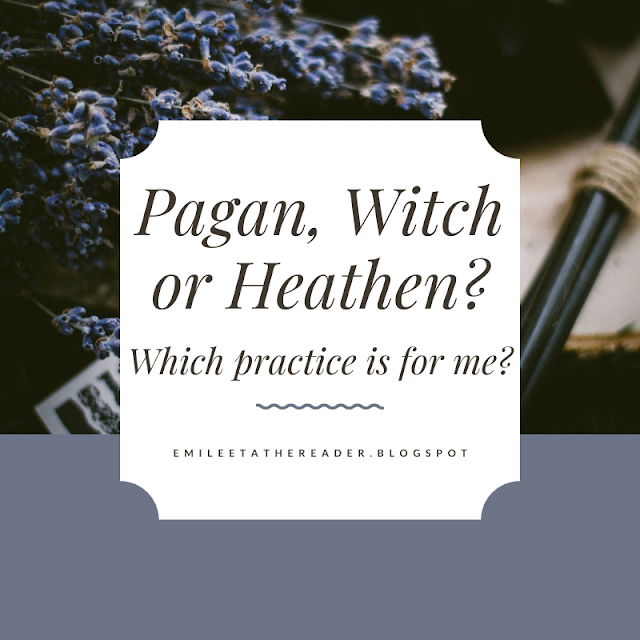Pagan, Witch, or Heathen?
Pagans, witches, heathens… what are they? And which
one is best for my practices?
Pagan, Witch, and Heathen all have negative connotations but have been adopted to describe particular traditional beliefs. But what’s the difference and which is the right for me?
In her book, The Witch of the Forest’s Guide to Natural Magick, Lindsay Squire beautifully explains the differences in Paganism, Wicca, and Witchcraft, so let’s start there as each of these is often used as umbrella terms for each other, despite their differences. To help differentiate, I will be referring to practitioners of Witchcraft as “Witches” and Wiccan follows as “Wiccans”, though each is considered a witch.
Paganism is a broad term for any religion, typically in Western Europe, which isn’t one of the three Abrahamic religions: Christianity, Judaism, and Islam. The word “pagan” has had the negative historical Christian connotation to mean people who worship false gods. Paganism is a nature, or Earth, based folk religion that honours both deities and the natural world. Spirituality, fertility, and nature are at the heart of most Pagan beliefs. It follows the cycles of nature, such as the seasons and moon phases, with deities often relating in some way to these as well. There are many different traditions that fall under paganism, including Druidry, Wicca, Shamanism, Asatru, and Heathenism.
Wicca
 is known as a neo-pagan religion as it is relatively
only recent compared to some of the more ancient traditions. As Squire puts it,
“A Wiccan is a person who is Pagan and a practitioner of Witchcraft.”
Typically, Wiccans share a belief that the Goddess is the moon and God is the
sun, with some branches believing in multiple other deities as well. Wiccans
also follow the Wheel of the Year and celebrate the Solstices and Equinoxes
coinciding with their seasons. Wiccans also practice rituals that derive from
pre-Christian religious beliefs the same as Witches.
is known as a neo-pagan religion as it is relatively
only recent compared to some of the more ancient traditions. As Squire puts it,
“A Wiccan is a person who is Pagan and a practitioner of Witchcraft.”
Typically, Wiccans share a belief that the Goddess is the moon and God is the
sun, with some branches believing in multiple other deities as well. Wiccans
also follow the Wheel of the Year and celebrate the Solstices and Equinoxes
coinciding with their seasons. Wiccans also practice rituals that derive from
pre-Christian religious beliefs the same as Witches.Witchcraft is a practice and not a religion, which involves the practice of magickal skills and rituals to create one’s own individual path. Not all witches are religious in the sense of honouring deities, instead, they honour the flow and rhythms of nature. The word “witch” is commonly associated with Satanism and devil worship, which are in themselves wholly different traditions. However, this is a common misconception as Wicca and Witchcraft are based on traditions, beliefs, and rituals from long before Christianity and the concept of hell and Satan existed. There is no connection, nor has there ever been, between them.
Heathenism envelops a number of beliefs and traditions, similar to Paganism, such as Asatru, Odinism and Germanic Pagan Reconstructionism, and Norse Paganism. Asatru is an officially recognised religion in Iceland and focuses on peace, ancestors, and equality. Heathenry recognises gods of Germanic and Nordic origin and spiritual beings connected to nature. Unlike Wicca and some forms of Paganism, Heathenism does not practice or focus on magick and witchcraft, rather their ancestors and gods are the center of their religion.Now, to really show how deep the rabbit hole is, there are two approaches to practicing known as Eclecticism and Reconstructionism. Your approach to how you practice and how you connect with your spirituality will often fall under one or the other, however, there is no rule about following both. Eclecticists and Reconstructionists can be found in almost all religions and traditions, not just paganism, so it can be helpful to know the difference between the two.
Eclecticism is rooted in the experience and personal path of the practitioner. It is more about your personal feeling and what you connect to, rather than following rigid guidelines for your practice. This means that each eclectic’s interpretation may be different, creating variables if you are practicing in a group of some kind. Eclectics may feel more doubt about their experiences and interpretations if this is the case. But, if you are a lone practitioner then this form of tradition is perhaps the most personal and fulfilling.
Reconstructionism is rooted in historical research and aspires to rebuild a traditional religion with the information we have to the best of our abilities. This may require some research on your own part into your chosen beliefs but will create a deeper connection at the same time. Having the history of the rituals, worship, and practices of your chosen tradition can be reassuring as there are more guides for you to help stave off doubt. However, it is important to be aware that with all historical research there is bound to be some biases from the individual researcher, and new research may also create some uncertainty as new information may cause a shift in spiritual practice to better reconstruct the original traditions.
If one of these spiritual practices speaks to you use it as a starting point. Go out and discover what works for you, what feels right, what fills you with love and spiritual satisfaction. It’s called a spiritual journey, not a spiritual destination, for a reason. So, enjoy the journey as you embark on your spiritual path.






Comments
Post a Comment